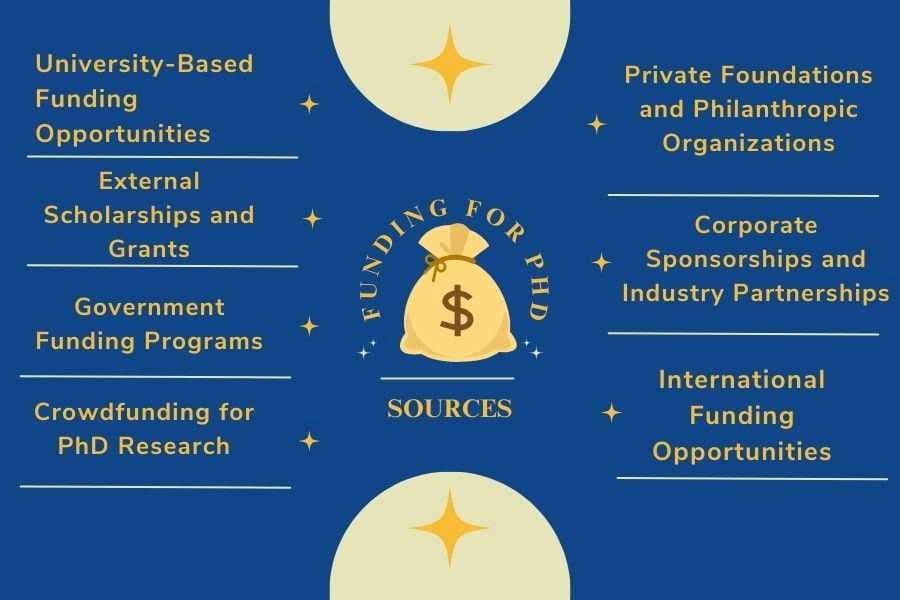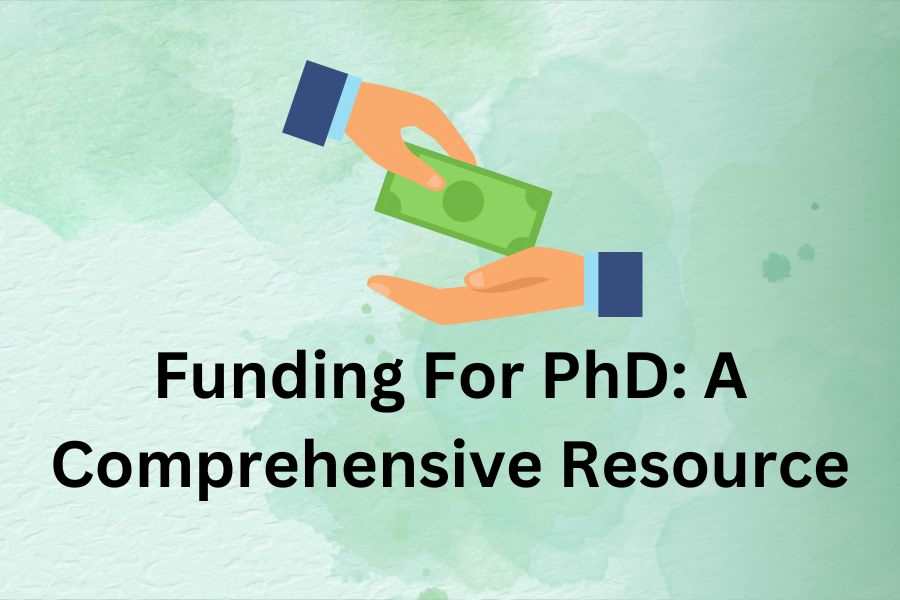Last updated on November 25th, 2025 at 12:49 pm
Introduction: The Cost and Funding For PhD
Pursuing a PhD can be financially challenging, with annual costs averaging around $55,000, including tuition, living expenses, books, and research fees.
For students dedicating years to intensive research and study, these costs can add up substantially, emphasizing the importance of finding reliable sources of funding for PhD.
Table of Contents
I have provided a detailed roadmap for securing financial support through various means, helping to alleviate some of the financial burdens associated with doctoral studies.

1. University-Based Funding Opportunities
- Scholarships: Many universities offer scholarships specifically for PhD students based on academic merit. These can reduce or even cover full tuition costs, allowing students to focus more on their research.
- Fellowships often provide stipends to cover living expenses in addition to tuition fees. They are highly competitive but can be invaluable, particularly for students with specific research interests and experience.
- Teaching and Research Assistantships: These roles provide both financial support and valuable experience. Teaching assistantships involve helping professors with lectures and grading, while research assistantships allow students to work on funded projects within their field.
2. External Scholarships and Grants
- Merit-Based Scholarships: Various organizations provide merit-based funding for students who excel academically. These scholarships can be discipline-specific or open to all fields, depending on the sponsoring organization.
- Need-Based Grants: These grants help students who demonstrate financial need. They often require a detailed application and can sometimes cover both tuition and living expenses.
- Specialized Grants for Underrepresented Groups: Organizations often offer grants specifically designed to support students from underrepresented backgrounds in academia, thereby encouraging diversity in advanced research fields.
3. Government Funding Programs
- Federal Fellowships and Research Grants: Many federal programs provide financial support for doctoral research. Agencies such as the National Science Foundation (NSF) offer grants and fellowships to students in various disciplines.
- Fulbright and Other International Programs: International students or U.S. citizens conducting research abroad can benefit from programs like the Fulbright Scholarship, which funds international educational exchange and research.
- Loan Forgiveness Programs for Doctoral Students: Certain government programs offer loan forgiveness for doctoral graduates who work in specific sectors, such as public service or healthcare.
4. Private Foundations and Philanthropic Organizations
- Notable Foundations Supporting Doctoral Research: Foundations such as the Ford Foundation and the Bill & Melinda Gates Foundation fund research across various disciplines, providing stipends, grants, and special fellowships.
Tip: When applying for Foundation Grants, you should research and identify foundations aligned with your specific research goals and interests. Also, composing a strong proposal is crucial to securing funding from these sources.
- The Impact of Philanthropic Support in Higher Education: Philanthropic funding enables students to address pressing societal issues through research, making it a highly impactful source of support for projects in the public interest.
5. Corporate Sponsorships and Industry Partnerships
- Industry-Specific Sponsorship Programs: Companies in fields such as engineering, technology, and medicine often sponsor doctoral students who align with their research needs, sometimes leading to future job offers.
- Securing Funding Through Industry Connections: Networking with professionals and professors with industry ties can open doors to potential sponsorships, which often come with both financial backing and mentorship opportunities.
Tip: While industry sponsorship can provide significant financial support, you must ensure that your academic freedom and research goals align with corporate interests.
6. International Funding Opportunities
- Scholarships for International Students in the U.S.: Many U.S. institutions and organizations offer scholarships specifically designed for international students, helping to cover tuition and living expenses.
- Country-Specific Funding Programs: Some countries offer financial support to their citizens studying abroad, particularly at the doctoral level, as a means to develop skilled professionals.
- Global Organizations Supporting International Scholars: Organizations such as UNESCO and the World Bank offer fellowships and grants to students worldwide, supporting research that contributes to global development.
7. Crowdfunding for PhD Research
- Utilizing Crowdfunding Platforms for Education: Websites like GoFundMe and Kickstarter enable students to raise funds directly from the public for their research projects.
Tip: Develop a strong crowdfunding campaign with a clear narrative about the research’s significance that can resonate with potential donors.
- Examples of Successful Crowdfunded Projects: Highlighting successful PhD crowdfunding campaigns can provide inspiration and guidance for students considering this route.
8. Writing Winning Funding Proposals
- Understanding Proposal Components: A funding proposal typically includes an abstract, research objectives, methodology, and budget overview. Each section should be precise and compelling.
Tips: 1] Customizing your proposal to the funding source’s priorities and demonstrating the potential impact of the research is key; and 2] Avoiding common errors, such as vague objectives or overlooking application instructions, can improve the chances of securing funding.
9. Managing PhD Finances Wisely
- Budgeting for Tuition, Supplies, and Living Expenses: Creating a budget that accounts for all anticipated expenses helps students manage limited resources effectively.
- Saving Strategies for Doctoral Students: Taking advantage of student discounts, sharing housing, and applying for small research grants can help students stretch their funding.
- Avoiding Common Financial Pitfalls: Overborrowing and mismanaging funds can lead to long-term debt, so it’s essential to approach finances strategically.
10. Alternative Options if Funding Is Limited
- Part-Time or Online Doctoral Programs: These programs often allow students to work while studying, making it easier to support themselves financially.
- Taking Breaks Between Stages of the PhD: Some students take time off between completing coursework, exams, and dissertation stages to work and save money.
- Postdoctoral Positions and Additional Opportunities: Following graduation, postdoctoral positions and adjunct teaching roles can provide financial stability while advancing academic careers.
FAQs
What is the difference between a fully funded PhD and partial funding?
A fully funded PhD covers tuition fees, living expenses, research costs, and sometimes health insurance. This funding typically comes through fellowships, assistantships, or grants, and a partially funded PhD covers only a portion of the costs, such as tuition fees or a stipend, leaving students to secure additional funding for other expenses.
Can I get paid while pursuing a PhD?
Yes, PhD students often receive a stipend or salary through:
1] Research or Teaching Assistantships: Paid positions where you contribute to teaching or research.
Fellowships: Provide funding without work requirements, and
2] Part-Time Jobs: Some students work part-time, either on or off-campus, to supplement their funding.
Are there funding opportunities for international PhD students?
There are university-specific scholarships and fellowships, as well as international funding programs such as the Chevening Scholarships (UK) or the Fulbright Program (US).
Also, research grants or exchange programs sponsored by governments and private organizations are available.
Conclusion: Making Funding For PhD Attainable
Obtaining funding is a critical step in pursuing a PhD, but it is achievable with the right strategy and persistence. From university-based options to government grants and private foundations, numerous avenues are available to support students in their academic journey.
By carefully considering and applying to multiple funding sources, PhD students can focus more fully on their research and professional growth, making the experience both financially manageable and deeply rewarding.




